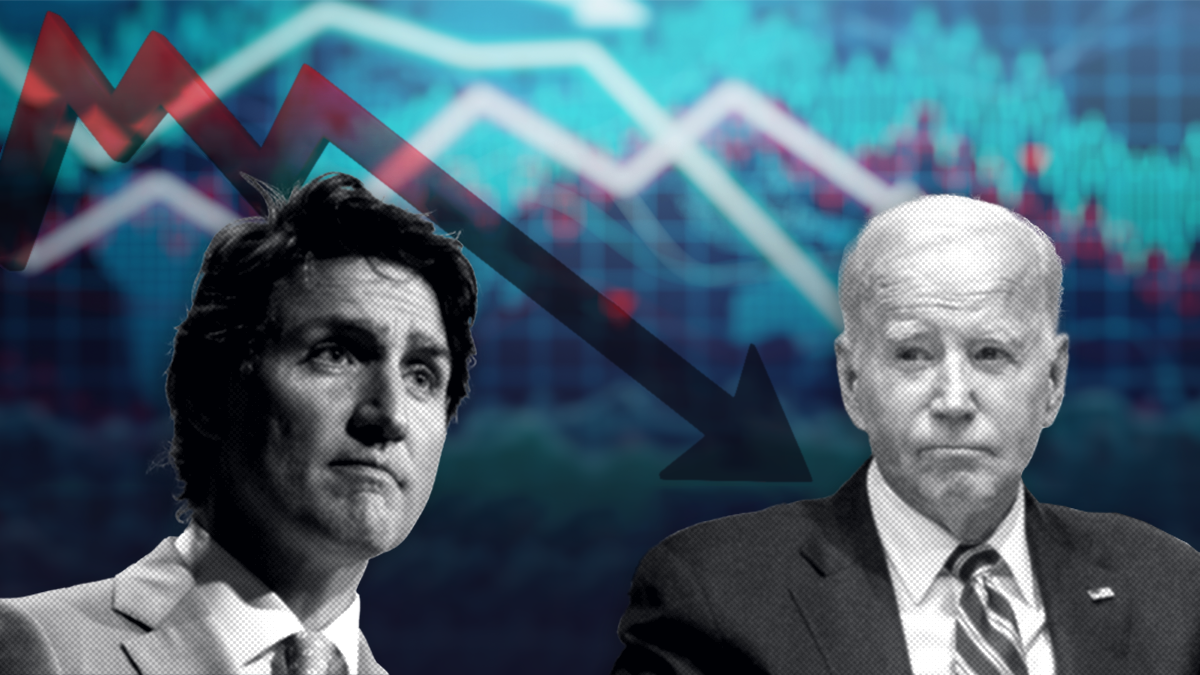Economists and political observers are busy assessing what the new year could bring for the US and Canadian economies. Interest rates, inflation, GDP growth, job numbers, and government spending will shape the lives of hundreds of millions of people – while helping determine the political futures of President Joe Biden and Prime Minister Justin Trudeau. The two men are staring down elections in November 2024 and October 2025 respectively.
Both their economies look set to avoid the worst predictions from recent years, with the US in slightly better shape than Canada. But none of that may be enough to generate sufficient political support to keep Biden or Trudeau at the helm.
Of course, economic predictions come with asterisks. Look back at the forecasts for 2023, and you’ll find a pessimistic trend that didn’t materialize to the extent expected. For instance, both countries avoided recessions, and the US economy managed strong GDP and job growth, but that didn’t boost Biden’s popularity much.
How does the economy feel?
Opinions about everything from health care to the war against Hamas seem to be influenced by political allegiance these days, and the economy is no different.
“Views on how people feel about the economy skew very much along party lines,” says Graeme Thompson, a senior analyst at Eurasia Group. “If you're a Democrat, you're far more likely to say that the economy is good. If you’re a Republican, you're far more likely to say that the economy is bad. And that suggests that people have baked in a narrative that isn't all that responsive to the actual numbers.”
Back in November, Canadians surveyed weren’t feeling great about the economy, either. About half of them felt worse off than a year ago, which would explain why a poll around the same time found that roughly two-thirds wanted to see Trudeau go, including some past Liberal voters, though the die-hards still support him.
Political identity isn’t the only factor shaping impressions. The economy under Biden has been stronger than it was under former President Donald Trump, but it doesn’t feel that way, particularly as folks struggle with high prices and housing costs. There’s a difference, after all, between abstract macro indicators and how people experience – or evaluate – the effects of the economy.
Thompson notes that economic indicators don’t tell the whole story. “If you're living on a fixed income and you've just had a 40-year high in inflation,” he says, “no matter what the aggregate numbers are, you still feel distinctly worse off.” Even with inflation easing, for those whose wages haven’t kept up, they’re noticing high prices and feeling the decline in their purchasing power.
The US is also facing an increasingly rough housing market, with insufficient supply and high mortgage rates putting pressure on buyers and renters alike – a challenge reminiscent of the housing crisis that has plagued Canada for years. In December, 73% of Canadians said high-interest rates meant they couldn’t buy or sell a home. In the fall, the average home price in the country was over $750,000 – 141% higher than what the median family can afford. The tightening market is also bad for ancillary industries, affecting businesses that deal in home improvement, storage, moving, and furniture.
A story of two governments
The US economy grew by 4.9% in the third quarter of 2023, and that growth is expected to slow in 2024 but remain positive, meaning the country may well manage to avoid a recession. The Federal Reserve has indicated it intends to cut interest rates three times in 2024 as inflation drops toward 2%, which suggests its anti-inflationary tools are working, and that it may be time to put them away.
Canada’s economic growth, on the other hand, has been sluggish. Its GDP contracted by 0.3% in Q3 2023, and the Business Development Bank of Canada is forecasting GDP growth of 0.9% in 2024 – a slight drop from last year’s 1.1% growth – and an interest rate cut by the summer. The modest 2024 projection indicates a recession is possible – and more likely than in the US – but that a soft landing is certainly achievable.
According to DT Cochrane, a senior economist with the Canadian Labour Congress, the gap in US and Canadian growth is largely caused by differences in government spending. “The US is just spending orders of magnitude more than Canada is spending, even taking into consideration the different sizes of the two economies,” he says. “And while a lot of economists are pointing to the massive increase in US government debts and saying, ‘Oh, this is a bad sign’, it's also the major driver of the US economic recovery in 2023.”
While observers on both sides of the border may be cautiously optimistic that each country is on a path back toward normal, economic risks remain, and Americans are in shape to manage these threats. Median purchasing power in the US has recovered, Cochrane notes, but not in Canada, where people “have more reason to feel pessimistic and upset about where the economy is at.” While the country is enjoying “historically low” unemployment levels and “historically high” job participation rates, that good news isn’t leading to optimism among weary Canadians.
Economic fortunes, political misfortunes
For Biden, Trudeau, and the hundreds of millions of people in Canada and the US, 2024 is set to be a test of hope and resilience – and, more importantly, the struggle for long-term economic policies that will keep folks on Main Street afloat. While the forecasts are modestly hopeful – at least when it comes to avoiding the worst-case scenarios discussed last year – we’ve seen that forecasts can be wrong. We also know that events can reshape the world in an instant when, for instance, the housing market crashes, a major war erupts, or a pandemic arrives. But the chances that Canada and the US will avoid a recession are better today than they looked a year ago, which is a hopeful note, of a sort, on which to start the new year.



















